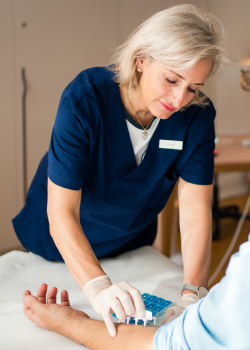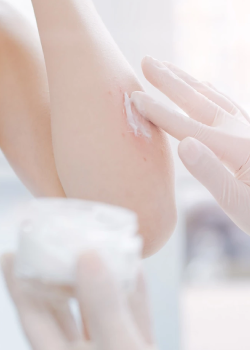Venereology owes its name to Venus, the goddess of love, and is dedicated to the diagnosis and therapy of sexually transmitted diseases. Sexually transmitted diseases (STDs) often manifest on the skin. Therefore, as a subfield of dermatology, it is an integral part of specialist medical training. The classic sexually transmitted diseases include gonorrhea, syphilis, chancroid, and lymphogranuloma inguinale. Sexual contact can also transmit infections such as HIV, hepatitis, trichomoniasis, herpes virus, and yeast infections, as well as genital warts (human papillomavirus/HPV) and parasitic diseases. If you suspect an infection, please visit us. And don’t worry: together we will establish a diagnosis and immediately initiate the appropriate treatment measures.

Genital warts are small growths in the genital area caused by a sexually transmitted infection with human papillomaviruses (HPV). Genital warts are the most common STD (sexually transmitted disease).
They are divided into high-risk and low-risk types. Low-risk types such as HPV 6 and 11 mainly cause genital warts. High-risk types such as HPV 16 and 18 are associated with the development of cervical carcinoma, anogenital carcinomas, and laryngeal carcinoma.
Genital warts are treated either with creams (Aldara, Veregen) or removed under local anesthesia using a ring curette and electrocautery. Alternatively, they can be ablated with a suitable laser.




Doctors with Heart and Experience
Modern Dermatology & Aesthetics
Heilwigstraße 33, 20249 Hamburg
We use cookies to optimize our website and our service.
Under settings, you will find detailed information and can make your choices. You can revoke or adjust your selection at any time in the cookie manager at the bottom right of the page.